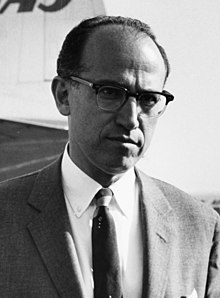
Back Jonas Salk Afrikaans جوناس سولك Arabic جوناس سولك ARZ Jonas Salk AST Conas Solk Azerbaijani جوناس سالک AZB Джонас Солк Byelorussian Джонас Солк Bulgarian জোনাস এডওয়ার্ড সল্ক Bengali/Bangla Jonas Salk BS
Jonas Salk | |
|---|---|
 Salk in 1959 | |
| Born | Jonas Salk October 28, 1914 New York City, U.S. |
| Died | June 23, 1995 (aged 80)[1] La Jolla, California, U.S.[1] |
| Resting place | El Camino Memorial Park (San Diego, California, U.S ) |
| Alma mater | |
| Known for | First polio vaccine |
| Spouses | |
| Children | 3 |
| Awards |
|
| Scientific career | |
| Fields |
|
| Institutions | |
| Doctoral advisor | Thomas Francis Jr. |
| Signature | |
 | |
Jonas Edward Salk (/sɔːlk/; born Jonas Salk; October 28, 1914 – June 23, 1995) was an American virologist and medical researcher who developed one of the first successful polio vaccines. He was born in New York City and attended the City College of New York and New York University School of Medicine.[2]
In 1947, Salk accepted a professorship at the University of Pittsburgh School of Medicine, where he undertook a project beginning in 1948 to determine the number of different types of poliovirus. For the next seven years, Salk devoted himself to developing a vaccine against polio.
Salk was immediately hailed as a "miracle worker" when the vaccine's success was first made public in April 1955, and chose to not patent the vaccine or seek any profit from it in order to maximize its global distribution.[2] The National Foundation for Infantile Paralysis and the University of Pittsburgh looked into patenting the vaccine, but since Salk's techniques were not novel, their patent attorney said, "If there were any patentable novelty to be found in this phase it would lie within an extremely narrow scope and would be of doubtful value."[3][4] An immediate rush to vaccinate began in the United States and around the world. Many countries began polio immunization campaigns using Salk's vaccine, including Canada, Sweden, Denmark, Norway, West Germany, the Netherlands, Switzerland, and Belgium. By 1959, the Salk vaccine had reached about 90 countries.[5] An attenuated live oral polio vaccine was developed by Albert Sabin, coming into commercial use in 1961. Less than 25 years after the release of Salk's vaccine, domestic transmission of polio had been eliminated in the United States.
In 1963, Salk founded the Salk Institute for Biological Studies in La Jolla, California, which is today a center for medical and scientific research. He continued to conduct research and publish books in his later years, focusing in his last years on the search for a vaccine against HIV. Salk campaigned vigorously for mandatory vaccination throughout the rest of his life, calling the universal vaccination of children against disease a "moral commitment".[6] Salk's personal papers are today stored in Geisel Library at the University of California, San Diego.[7][8]
- ^ a b c d e f g h i j k "Dr. Jonas Salk, Whose Vaccine Turned Tide on Polio, Dies at 80". The New York Times. June 24, 1995. Archived from the original on October 13, 2022. Retrieved October 23, 2020.
- ^ a b "About Jonas Salk – Salk Institute for Biological Studies". Salk Institute for Biological Studies. Archived from the original on November 21, 2015. Retrieved February 22, 2016.
- ^ Cite error: The named reference
latimes.comwas invoked but never defined (see the help page). - ^ Cite error: The named reference
bio.orgwas invoked but never defined (see the help page). - ^ Tan, Siang Yong; Ponstein, Nate (January 2019). "Jonas Salk (1914–1995): A vaccine against polio". Singapore Medical Journal. 60 (1): 9–10. doi:10.11622/smedj.2019002. ISSN 0037-5675. PMC 6351694. PMID 30840995.
- ^ Jacobs, Charlotte DeCroes. "Vaccinations have always been controversial in America: Column" Archived September 29, 2022, at the Wayback Machine, USA Today, August 4, 2015
- ^ "UC San Diego Library Receives Personal Papers of Jonas Salk" Archived September 29, 2022, at the Wayback Machine, Newswise, March 20, 2014
- ^ San Diego Union Tribune, 20 March 2014: "UCSD to house Salk's papers" Archived May 6, 2016, at the Wayback Machine, accessed July 3, 2015.